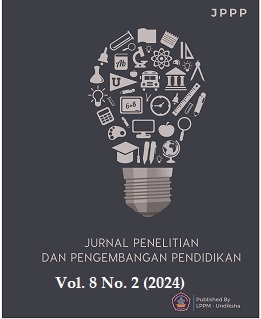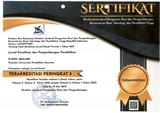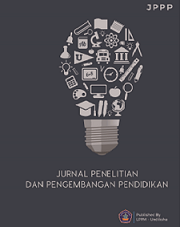Transformation of Teaching Practices Through Principal Leadership in Bekasi Middle Schools
DOI:
https://doi.org/10.23887/jppp.v8i2.74166Keywords:
Supervision, Principal, Teacher, Junior High SchoolAbstract
The principal is given more authority than teachers. One of them is to regulate and supervise the learning planning process, implementation, assessment and evaluation that must be carried out by teachers in the learning process. However, in fact, many teachers do not agree with the principal's policy in junior high schools. It was recorded that 54% considered that the principal only looked at the administration without paying attention to quality. Some other teachers considered that the principal only focused on bureaucracy, namely 48.88%. A study needs to be conducted with the gap between expectations and reality. So, the purpose of the study is to analyze and evaluate the performance of the principal and its influence on the implementation of the duties and responsibilities of teachers in schools. In this study, the method used was a quantitative type of Survey. With the number of respondents who assessed as many as 138 people from junior high schools spread across the city of Bekasi. The data collection technique used an instrument, and the instrument had been developed, validated and tested for reliability. The instrument was given to 138 junior high school teachers to be assessed. The instrument was distributed via a Google link. Each instrument item is assessed with a Likert scale, namely points 1-5, ranging from strongly disagree to strongly agree. The analysis technique with descriptive statistics assisted by SPSS Version 26.0 by looking at the mean, standard deviation, percentage and describing it in a bar chart. The results found that the principal was assessed as being in accordance with his duties and responsibilities as a principal. This finding confirms that the previous assessment was only valid in certain areas. The principal has carried out his duties well and is assessed as having provided a lot of input to teachers and not only paying attention to administration but also providing training on planning, how to compile materials, implementation, how to assess, conduct evaluations and provide training to junior high school teachers.
References
Ahmad, S. T., Watrianthos, R., Samala, A. D., Muskhir, M., & Dogara, G. (2023). Project-based Learning in Vocational Education: A Bibliometric Approach. International Journal of Modern Education and Computer Science, 15(4), 43–56. https://doi.org/10.5815/ijmecs.2023.04.04. DOI: https://doi.org/10.5815/ijmecs.2023.04.04
Anvari, F., & Lakens, D. (2021). Using anchor-based methods to determine the smallest effect size of interest. Journal of Experimental Social Psychology, 96(December 2020), 1-11. https://doi.org/10.1016/j.jesp.2021.104159. DOI: https://doi.org/10.1016/j.jesp.2021.104159
Atiah, N., Fitria, H., & Destiniar, D. (2020). Effect of Principal’s Coaching and Supervision toward Teacher’s Performance. International Journal of Educational Review, 3(1), 88–93. https://doi.org/10.33369/ijer.v3i1.12179. DOI: https://doi.org/10.33369/ijer.v3i1.12179
Bjørndal, C. R. P. (2020). Student teachers ’ responses to critical mentor feedback : A study of face-saving strategies in teaching placements. Teaching and Teacher Education, 91(May 2020), 103047.1-12. https://doi.org/10.1016/j.tate.2020.103047. DOI: https://doi.org/10.1016/j.tate.2020.103047
Bolton-King, R. S. (2022). Student mentoring to enhance graduates’ employability potential. Science and Justice, 62(6), 785–794. https://doi.org/10.1016/j.scijus.2022.04.010. DOI: https://doi.org/10.1016/j.scijus.2022.04.010
Burbules, N. C., Fan, G., & Repp, P. (2020). Geography and Sustainability Five trends of education and technology in a sustainable future. Geography and Sustainability, 1(2), 93–97. https://doi.org/10.1016/j.geosus.2020.05.001. DOI: https://doi.org/10.1016/j.geosus.2020.05.001
Carrero-Planells, A., Pol-Castañeda, S., Alamillos-Guardiola, M. C., Prieto-Alomar, A., Tomás-Sánchez, M., & Moreno-Mulet, C. (2021). Students and teachers’ satisfaction and perspectives on high-fidelity simulation for learning fundamental nursing procedures: A mixed-method study. Nurse Education Today, 104(2), 1-6. https://doi.org/10.1016/j.nedt.2021.104981. DOI: https://doi.org/10.1016/j.nedt.2021.104981
Chaharbashloo, H., Gholami, K., Aliasgari, M., Talebzadeh, H., & Mousapour, N. (2020). Analytical reflection on teachers’ practical knowledge: A case study of exemplary teachers in an educational reform context. Teaching and Teacher Education, 87(2), 102931.1-15. https://doi.org/10.1016/j.tate.2019.102931. DOI: https://doi.org/10.1016/j.tate.2019.102931
Chugh, R., Macht, S., & Harreveld, B. (2022). Supervisory feedback to postgraduate research students: a literature review. Assessment and Evaluation in Higher Education, 47(5), 683–697. https://doi.org/10.1080/02602938.2021.1955241. DOI: https://doi.org/10.1080/02602938.2021.1955241
Coleman, G., & Hyde, E. (2022). Is there a role for professional supervision in supporting the professional and personal wellbeing of the sonographic workforce? A literature review. Radiography, 28(4), 991–998. https://doi.org/10.1016/j.radi.2022.07.008. DOI: https://doi.org/10.1016/j.radi.2022.07.008
Collard, S. S., Scammell, J., & Tee, S. (2020). Closing the gap on nurse retention: A scoping review of implications for undergraduate education. Nurse Education Today, 84(October 2019), 104253.1-8. https://doi.org/10.1016/j.nedt.2019.104253. DOI: https://doi.org/10.1016/j.nedt.2019.104253
Cruz-González, C., Rodríguez, C. L., & Segovia, J. D. (2021). A systematic review of principals’ leadership identity from 1993 to 2019. Educational Management Administration and Leadership, 49(1), 31–53. https://doi.org/10.1177/1741143219896053. DOI: https://doi.org/10.1177/1741143219896053
Eranıl, A., & Barış, A. (2022). An Analysis of the Education System in Turkey: Supervision Policies Between the Years 1980 – 2021. Journal of Educational Supervision, 5(3), 35–60. https://doi.org/10.31045/jes.5.3.2. DOI: https://doi.org/10.31045/jes.5.3.2
García-Lázaro, I., Conde-Jiménez, J., & Colás-Bravo, M. P. (2022). Integration and Management of Technologies Through Practicum Experiences: A Review in Preservice Teacher Education (2010-2020). Contemporary Educational Technology, 14(2), 1-9. https://doi.org/10.30935/cedtech/11540. DOI: https://doi.org/10.30935/cedtech/11540
Ghosn-Chelala, M. (2020). Global citizenship education in conflict-affected settings: Implications of teachers’ views and contextual challenges for the Lebanese case. Teaching and Teacher Education, 93(July 2020), 103078.1-11. https://doi.org/10.1016/j.tate.2020.103078. DOI: https://doi.org/10.1016/j.tate.2020.103078
Granberg, C., Palm, T., & Palmberg, B. (2021). A case study of a formative assessment practice and the effects on students’ self-regulated learning. Studies in Educational Evaluation, 68(November 2020), 1-10. https://doi.org/10.1016/j.stueduc.2020.100955. DOI: https://doi.org/10.1016/j.stueduc.2020.100955
Gümüş, S., Bellibaş, M. Ş., Gümüş, E., & Hallinger, P. (2020). Science mapping research on educational leadership and management in Turkey: a bibliometric review of international publications. School Leadership and Management, 40(1), 23–44. https://doi.org/10.1080/13632434.2019.1578737. DOI: https://doi.org/10.1080/13632434.2019.1578737
Gümüş, S., Hallinger, P., Cansoy, R., & Bellibaş, M. Ş. (2021). Instructional leadership in a centralized and competitive educational system: a qualitative meta-synthesis of research from Turkey. Journal of Educational Administration, 59(6), 702–720. https://doi.org/10.1108/JEA-04-2021-0073. DOI: https://doi.org/10.1108/JEA-04-2021-0073
Haugland, B. S. M., Haaland, Å. T., Baste, V., Bjaastad, J. F., Hoffart, A., Rapee, R. M., Raknes, S., Himle, J. A., Husabø, E., & Wergeland, G. J. (2020). Effectiveness of Brief and Standard School-Based Cognitive-Behavioral Interventions for Adolescents With Anxiety: A Randomized Noninferiority Study. Journal of the American Academy of Child and Adolescent Psychiatry, 59(4), 552-564.e2. https://doi.org/10.1016/j.jaac.2019.12.003. DOI: https://doi.org/10.1016/j.jaac.2019.12.003
Husamah, H., Suwono, H., Nur, H., & Dharmawan, A. (2022). Environmental education research in Indonesian Scopus indexed journal: A systematic literature review. JPBI (Jurnal Pendidikan Biologi Indonesia), 8(2), 105–120. https://doi.org/10.22219/jpbi.v8i2.21041. DOI: https://doi.org/10.22219/jpbi.v8i2.21041
İnceçay, V., & Dikilitaş, K. (2022). Online peer observation: Reflections on a process-based job-embedded professional development activity through video recordings. Teaching and Teacher Education, 120(2), 103901.1-11. https://doi.org/10.1016/j.tate.2022.103901. DOI: https://doi.org/10.1016/j.tate.2022.103901
Jan, A. (2020). A phenomenological study of synchronous teaching during COVID-19: A case of an international school in Malaysia. Social Sciences and Humanities Open, 2(1), 100084.1-9. https://doi.org/10.1016/j.ssaho.2020.100084. DOI: https://doi.org/10.1016/j.ssaho.2020.100084
Johnson, J. L., Adkins, D., & Chauvin, S. (2020). A review of the quality indicators of rigor in qualitative research. American Journal of Pharmaceutical Education, 84(1), 138–146. https://doi.org/10.5688/ajpe7120. DOI: https://doi.org/10.5688/ajpe7120
Josa, I., & Aguado, A. (2021). Social sciences and humanities in the education of civil engineers: Current status and proposal of guidelines. Journal of Cleaner Production, 311(February 2020), 127489.1-16. https://doi.org/10.1016/j.jclepro.2021.127489. DOI: https://doi.org/10.1016/j.jclepro.2021.127489
Julia, J., Supriatna, E., Isrokatun, I., Aisyah, I., Hakim, A., & Odebode, A. A. (2020). Moral education (2010-2019): A bibliometric study (Part 2). Universal Journal of Educational Research, 8(7), 2954–2968. https://doi.org/10.13189/ujer.2020.080724. DOI: https://doi.org/10.13189/ujer.2020.080724
Keinänen, A. L., Lähdesmäki, R., Juntunen, J., Tuomikoski, A. M., Kääriäinen, M., & Mikkonen, K. (2023). Effectiveness of mentoring education on health care professionals´ mentoring competence: A systematic review. Nurse Education Today, 121(January), 1-10. https://doi.org/10.1016/j.nedt.2023.105709. DOI: https://doi.org/10.1016/j.nedt.2023.105709
Kim, S., Jeong, H., Cho, H., & Yu, J. (2023). Extracurricular activities in medical education: an integrative literature review. BMC Medical Education, 23(1), 1–11. https://doi.org/10.1186/s12909-023-04245-w. DOI: https://doi.org/10.1186/s12909-023-04245-w
Labrague, L. J., McEnroe-Petitte, D. M., D’Souza, M. S., Hammad, K. S., & Hayudini, J. N. A. (2020). Nursing faculty teaching characteristics as perceived by nursing students: an integrative review. Scandinavian Journal of Caring Sciences, 34(1), 23–33. https://doi.org/10.1111/scs.12711. DOI: https://doi.org/10.1111/scs.12711
Luca, A., Giorgino, R., Gesualdo, L., Peretti, G. M., Belkhou, A., Banfi, G., & Grasso, G. (2020). Innovative Educational Pathways in Spine Surgery: Advanced Virtual Reality–Based Training. World Neurosurgery, 140, 674–680. https://doi.org/10.1016/j.wneu.2020.04.102. DOI: https://doi.org/10.1016/j.wneu.2020.04.102
Marey, R., Hesham, G., Magdd, A., & Toprak, M. (2020). Re-conceptualizing teacher evaluation and supervision in the light of educational reforms in Egypt. Social Sciences and Humanities Open, 2(1), 100081.1-8. https://doi.org/10.1016/j.ssaho.2020.100081. DOI: https://doi.org/10.1016/j.ssaho.2020.100081
Mishra, L., Gupta, T., & Shree, A. (2020). Online teaching-learning in higher education during lockdown period of COVID-19 pandemic. International Journal of Educational Research Open, 1(September), 100012.1-8. https://doi.org/10.1016/j.ijedro.2020.100012. DOI: https://doi.org/10.1016/j.ijedro.2020.100012
Moè, A., & Katz, I. (2020). Self-compassionate teachers are more autonomy supportive and structuring whereas self-derogating teachers are more controlling and chaotic: The mediating role of need satisfaction and burnout. Teaching and Teacher Education, 96(1), 1-9. https://doi.org/10.1016/j.tate.2020.103173. DOI: https://doi.org/10.1016/j.tate.2020.103173
Mok, S. Y., & Staub, F. C. (2021). Does coaching, mentoring, and supervision matter for pre-service teachers’ planning skills and clarity of instruction? A meta-analysis of (quasi-)experimental studies. Teaching and Teacher Education, 107(2), 103484.1-14. https://doi.org/10.1016/j.tate.2021.103484. DOI: https://doi.org/10.1016/j.tate.2021.103484
Muthanna, A., & Alduais, A. (2021). A Thematic Review on Research Integrity and Research Supervision: Relationships, Crises and Critical Messages. Journal of Academic Ethics, 19(1), 95–113. https://doi.org/10.1007/s10805-020-09368-z. DOI: https://doi.org/10.1007/s10805-020-09368-z
Nęcki, M., Antończyk, R., Pandel, A., Gawęda, M., Latos, M., Urlik, M., Stącel, T., Wajda-Pokrontka, M., Zawadzki, F., Przybyłowski, P., Zembala, M., & Ochman, M. (2020). Impact of Cold Ischemia Time on Frequency of Airway Complications Among Lung Transplant Recipients. Transplantation Proceedings, 52(7), 2160–2164. https://doi.org/10.1016/j.transproceed.2020.03.047. DOI: https://doi.org/10.1016/j.transproceed.2020.03.047
Ofei, A. M. A., Paarima, Y., & Barnes, T. (2020). Exploring the management competencies of nurse managers in the Greater Accra Region, Ghana. International Journal of Africa Nursing Sciences, 13(September 2020), 100248.1-7. https://doi.org/10.1016/j.ijans.2020.100248. DOI: https://doi.org/10.1016/j.ijans.2020.100248
Rees, C. E., Lee, S. L., Huang, E., Denniston, C., Edouard, V., Pope, K., Sutton, K., Waller, S., Ward, B., & Palermo, C. (2020). Supervision training in healthcare: a realist synthesis. In Advances in Health Sciences Education (Vol. 25, Nomor 3). Springer Netherlands. https://doi.org/10.1007/s10459-019-09937-x. DOI: https://doi.org/10.1007/s10459-019-09937-x
Roberts, J. A., & David, M. E. (2020). Boss phubbing, trust, job satisfaction and employee performance. Personality and Individual Differences, 155(November), 109702.1-8. https://doi.org/10.1016/j.paid.2019.109702. DOI: https://doi.org/10.1016/j.paid.2019.109702
Rozi, A., Musfiqon, M., & Prasetiya, B. (2022). The Effectiveness of Principals’ Supervision in Improving Teacher Performance. KnE Social Sciences, 2022(2), 290–299. https://doi.org/10.18502/kss.v7i10.11231. DOI: https://doi.org/10.18502/kss.v7i10.11231
Sanusi, I. T., Oyelere, S. S., & Omidiora, J. O. (2022). Exploring teachers’ preconceptions of teaching machine learning in high school: A preliminary insight from Africa. Computers and Education Open, 3(November 2021), 100072.1-10. https://doi.org/10.1016/j.caeo.2021.100072. DOI: https://doi.org/10.1016/j.caeo.2021.100072
Schildkamp, K., van der Kleij, F. M., Heitink, M. C., Kippers, W. B., & Veldkamp, B. P. (2020). Formative assessment: A systematic review of critical teacher prerequisites for classroom practice. International Journal of Educational Research, 103(January), 101602.1-16. https://doi.org/10.1016/j.ijer.2020.101602. DOI: https://doi.org/10.1016/j.ijer.2020.101602
Schott, C., van Roekel, H., & Tummers, L. G. (2020). Teacher leadership: A systematic review, methodological quality assessment and conceptual framework. Educational Research Review, 31(March), 100352.1-24. https://doi.org/10.1016/j.edurev.2020.100352. DOI: https://doi.org/10.1016/j.edurev.2020.100352
Shen, J., Wu, H., Reeves, P., Zheng, Y., Ryan, L., & Anderson, D. (2020). The association between teacher leadership and student achievement: A meta-analysis. Educational Research Review, 31(October 2019), 100357.1-19. https://doi.org/10.1016/j.edurev.2020.100357. DOI: https://doi.org/10.1016/j.edurev.2020.100357
Sokal, L., Trudel, L. E., & Babb, J. (2020). Canadian teachers’ attitudes toward change, efficacy, and burnout during the COVID-19 pandemic. International Journal of Educational Research Open, 1(October), 100016.1-8. https://doi.org/10.1016/j.ijedro.2020.100016. DOI: https://doi.org/10.1016/j.ijedro.2020.100016
Soro, S. H. (2023). Academic Supervision as One of Education Policy Implementations (Case Study of the Islamic Religious Education Teacher Working Group in Sungai Tabuk District, Banjar Regency in the Perspective of General Education). Edukasi Islami: Jurnal Pendidikan Islam STAI Al Hidayah Bogor, 12(2), 1247–1262. https://doi.org/10.30868/ei.v12i02.3484.
Stahlschmidt, S., & Stephen, D. (2020). Comparison of Web of Science, Scopus and Dimensions databases. In Comparison of Web of Science, Scopus and Dimensions databases - KB Forschungspoolprojekt 2020 (Nomor October 2020, hal. 1–29).
Tang, M., & Liao, H. (2021). From conventional group decision making to large-scale group decision making: What are the challenges and how to meet them in big data era? A state-of-the-art survey. Omega (United Kingdom), 100(2), 102141.1-18. https://doi.org/10.1016/j.omega.2019.102141. DOI: https://doi.org/10.1016/j.omega.2019.102141
Tise, J. C., Hernandez, P. R., & Wesley Schultz, P. (2023). Mentoring underrepresented students for success: Self-regulated learning strategies as a critical link between mentor support and educational attainment. Contemporary Educational Psychology, 75(October), 102233.1-14. https://doi.org/10.1016/j.cedpsych.2023.102233. DOI: https://doi.org/10.1016/j.cedpsych.2023.102233
Tiwari, S. (2022). Supervised Machine Learning: A Brief Introduction. Proceedings of the International Conference on Virtual Learning, 17(5), 219–230. https://doi.org/10.58503/icvl-v17y202218. DOI: https://doi.org/10.58503/icvl-v17y202218
Uy, F. T., Sasan, J. M., & Kilag, O. K. (2023). School Principal Administrative-Supervisory Leadership During the Pandemic: A Phenomenological Qualitative Study. International Journal of Theory and Application in Elementary and Secondary School Education, 5(1), 44–62. https://doi.org/10.31098/ijtaese.v5i1.1208. DOI: https://doi.org/10.31098/ijtaese.v5i1.1208
van den Bogerd, N., Dijkstra, S. C., Tanja-Dijkstra, K., de Boer, M. R., Seidell, J. C., Koole, S. L., & Maas, J. (2020). Greening the classroom: Three field experiments on the effects of indoor nature on students’ attention, well-being, and perceived environmental quality. Building and Environment, 171(June 2019), 106675.1-10. https://doi.org/10.1016/j.buildenv.2020.106675. DOI: https://doi.org/10.1016/j.buildenv.2020.106675
van Kessel, R., Steinhoff, P., Varga, O., Breznoščáková, D., Czabanowska, K., Brayne, C., Baron-Cohen, S., & Roman-Urrestarazu, A. (2020). Autism and education—Teacher policy in Europe: Policy mapping of Austria, Hungary, Slovakia and Czech Republic. Research in Developmental Disabilities, 105(February), 1–10. https://doi.org/10.1016/j.ridd.2020.103734. DOI: https://doi.org/10.1016/j.ridd.2020.103734
Weller, J. M., Naik, V. N., & San Diego, R. J. (2020). Systematic review and narrative synthesis of competency-based medical education in anaesthesia. British Journal of Anaesthesia, 124(6), 748–760. https://doi.org/10.1016/j.bja.2019.10.025. DOI: https://doi.org/10.1016/j.bja.2019.10.025
Xu, X., Jiang, X., Ma, C., Du, P., Li, X., Lv, S., Yu, L., Ni, Q., Chen, Y., Su, J., Lang, G., Li, Y., Zhao, H., Liu, J., Xu, K., Ruan, L., Sheng, J., Qiu, Y., Wu, W., … Li, L. (2020). A Deep Learning System to Screen Novel Coronavirus Disease 2019 Pneumonia. Engineering, 6(10), 1122–1129. https://doi.org/10.1016/j.eng.2020.04.010. DOI: https://doi.org/10.1016/j.eng.2020.04.010
Downloads
Published
How to Cite
Issue
Section
License
Copyright (c) 2024 Mesta Mesta Limbong

This work is licensed under a Creative Commons Attribution-ShareAlike 4.0 International License.
Authors who publish with the Jurnal Penelitian dan Pengembangan Pendidikan agree to the following terms:
- Authors retain copyright and grant the journal the right of first publication with the work simultaneously licensed under a Creative Commons Attribution License (CC BY-SA 4.0) that allows others to share the work with an acknowledgment of the work's authorship and initial publication in this journal.
- Authors are able to enter into separate, additional contractual arrangements for the non-exclusive distribution of the journal's published version of the work (e.g., post it to an institutional repository or publish it in a book), with an acknowledgment of its initial publication in this journal.
- Authors are permitted and encouraged to post their work online (e.g., in institutional repositories or on their website) prior to and during the submission process, as it can lead to productive exchanges, as well as earlier and greater citation of published work. (See The Effect of Open Access)








